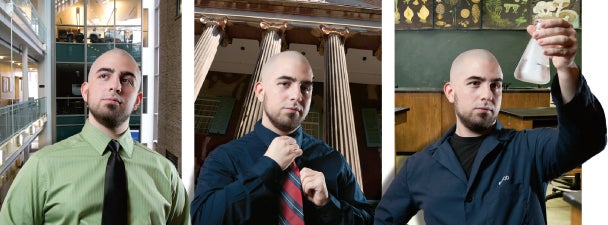
Six years ago, Dan Taber ’10 penned an admissions essay dripping with the all-knowing wisdom of a high school senior. It railed against the evils of socialism. It championed capitalism and free market economies. Most importantly, it got him into the Honors College.
Taber hasn’t looked at that essay since high school, but he’s sure that if he were to comb through his old computer files and find it, its presumptuous and naive tone would give him a big, long, hearty laugh. It’s not that he’s become a socialist, but rather that he’s found the world to be a bit more nuanced than he thought before entering the College. These days, he’s unwilling to argue any opinion without first collecting the facts.
One could describe Taber’s time at the College as one extensive fact-finding mission. In May, he graduated with degrees in political science and economics. This school year, he’s finishing coursework for a third major – in biology – and his professors are glad he’s not rushing away from campus. In class, he’s a valued student, soaking up material from lectures, asking questions and volunteering for research projects in the summer. And why not? After all, says Taber, there is always more to learn.
“Some people come into college looking for their own views to be reinforced,” he says. “I try not to have any sacred cows.”
Taber is the type of student professors love to teach: a true liberal arts scholar who finds connections between different academic disciplines. Economics professor Calvin Blackwell says Taber was an invaluable member of a four-man research team that he assembled for a study of voter behavior in primary elections. And even before he joined the study, formulating complicated mock elections and tallying results, Taber wowed Blackwell by excelling at a class project in which he was tasked with finding an environmental problem and posing a solution. Taber had noticed that computers in the library were wasting energy, partly because they were running after hours. By adjusting a few settings, Taber calculated, the College could use less energy and save thousands of dollars a year in electricity costs. It was advice the library heeded.
“He has a lot of initiative,” says Blackwell. “He thinks for himself.”
Biology professor Melissa Hughes agrees. “Dan’s just really curious about the world. If he has a question, he finds an answer. He doesn’t just wonder about something and forget about it,” says Hughes, who worked with Taber in a private tutorial that studied the application of game theory in the biological world. “It was a lot of fun. I learned tons.”
Learning – and education in general – is what Taber is all about. After he completes his third major, he hopes to become a teacher or professor, perhaps in biology. He has a keen interest in evolution and a desire to give students a stimulating introduction to the sciences. He’d like to encourage appetites for fact finding, too, as he laments that too many people’s opinions are ill informed and that too many decisions are not made rationally. Scientific evidence, he says, can provide a framework for reasonable discussions of some of the most vexing problems.
“For our long-term survival as a species, let alone as a society, we need to understand the world around us,” observes Taber. “Everything should be subject to critical examination.”




